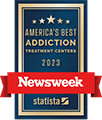Understanding Relapse
Alcohol abuse and addiction are prevalent problems throughout the United States and across the globe. Alcoholism, which is known clinically as alcohol use disorder, can have a devastating impact on virtually all aspects of an individual’s life, and overcome this problem is a tremendous accomplishment. Individuals who have the courage to get help, who make the commitment to regain their sobriety, and who do the hard work that is necessary to gain a solid foothold in recovery are worthy of great respect.
Unfortunately, the struggle to overcome an addiction to alcohol is an ongoing process. Even people who have gone years or decades without drinking are at risk of relapsing. Recovering from any addiction can be a difficult experience, but the prevalence of which alcohol is incorporated into modern society means that it is virtually impossible to avoid all situations where this drug is being consumed or promoted. Facing such constant temptation without compromising one’s continued recovery is one of many skills that an individual can learn while in a residential or outpatient treatment program.
In addition to getting people through the difficult first days without alcohol, effective treatment programs are designed to equip individuals with the capabilities and strategies that will support successful long-term recovery. With education, therapy, and continued effort, men and women whose lives had once been negatively impacted by alcoholism can avoid relapse and pursue a healthier and more productive future, free from the constraints and limitations alcohol abuse.
Why People Relapse
Why People Relapse Into Alcoholism
Completing treatment for alcohol addiction does not mean that one is immune to the risk of relapse. Many effective treatment programs spend significant amounts of time helping men and women in treatment to understand the many potential causes of relapse and to identify the events and experiences that may increase their personal likelihood of returning to alcohol abuse.
Factors that can push a person back into the destructive habit of alcohol abuse are known as triggers. The following are just a few of the virtually innumerable triggers that can complicate a person’s efforts to remain sober:
- Having intense physiological cravings for alcohol
- Associating with individuals who frequently abuse alcohol
- Attending social gatherings or other events at which alcohol use is prevalent
- Suffering a loss such as the end of a relationship or the death of a loved one
- Losing one’s job and/or having financial difficulties
- Experiencing an overwhelming amount of stress
- Making a major life change such as moving to a new city or changing jobs
- Developing symptoms of an anxiety disorder, depressive disorder, or other mental health condition
- Believing that one’s recovery efforts have been successful enough that one can consume alcohol in moderation and not experience long-term repercussions
Identifying triggers is an important relapse-prevention skill. As the next section will explain, learning how to respond to triggers and prepare for unforeseen challenges is to one’s continued recovery is also essential.
How to Prevent Relapse
How to Prevent Relapse Into Alcohol Addiction
Preventing relapse requires a combination of education, preparation, and action. Understanding your triggers, preparing for challenges to your recovery, and being proactive in your behaviors can put you in the best possible position to resist the urge to abuse alcohol. The following are among the many steps that you can take to protect your recovery and prevent relapse:
- When you complete treatment, be sure to follow the recommendations in your discharge plan, and also take advantage of any alumni activities, continuing care programs, or other opportunities that your program provides.
- Join a 12-Step support group, or a group that is based upon another philosophy, so that you can benefit from a continued connection with others in the recovery community.
- Develop a personal support network of close friends and/or trusted family members who can help you to monitor your health, keep you accountable to your recovery goals, and provide both practical and emotional support.
- Make a point of practicing self-care and using your stress-management skills every day. Do not wait for a crisis to occur before you engage in these behaviors. Preventative practice can yield many benefits.
- Follow a healthy diet, get appropriate amounts of exercise, and take all other necessary measures to maintain your strength and wellbeing. Physical health is an essential component of a healthy mind-body connection.
- Find productive ways to spend your leisure time. Hours that you may have previously spent drinking will need to be filled with healthy pursuits, or you may be tempted to return to self-defeating behavior patterns.
- Avoid people who will encourage you to consume alcohol or who will otherwise undermine your recovery.
- Avoid events and situations where the temptation to drink may exceed your ability to remain sober.
- Get help when you need help. There is no shame in entering a residential or outpatient program, or scheduling time with a therapist or counselor. You are worth the effort.
If you do relapse, remember that this does not mean that you have failed, or that your time in treatment was wasted. Relying on the skills and strategies that you learned during treatment and have been developing ever since can help you ensure that a relapse is slip-up is a temporary setback, not an insurmountable obstacle.
To learn more about relapse prevention, treatment for alcohol addiction, or any other aspect of our programming, please feel free to contact us at your convenience. We look forward to answering all of your questions and helping you determine if Wilmington Treatment Center is the perfect place for your or a loved one.







